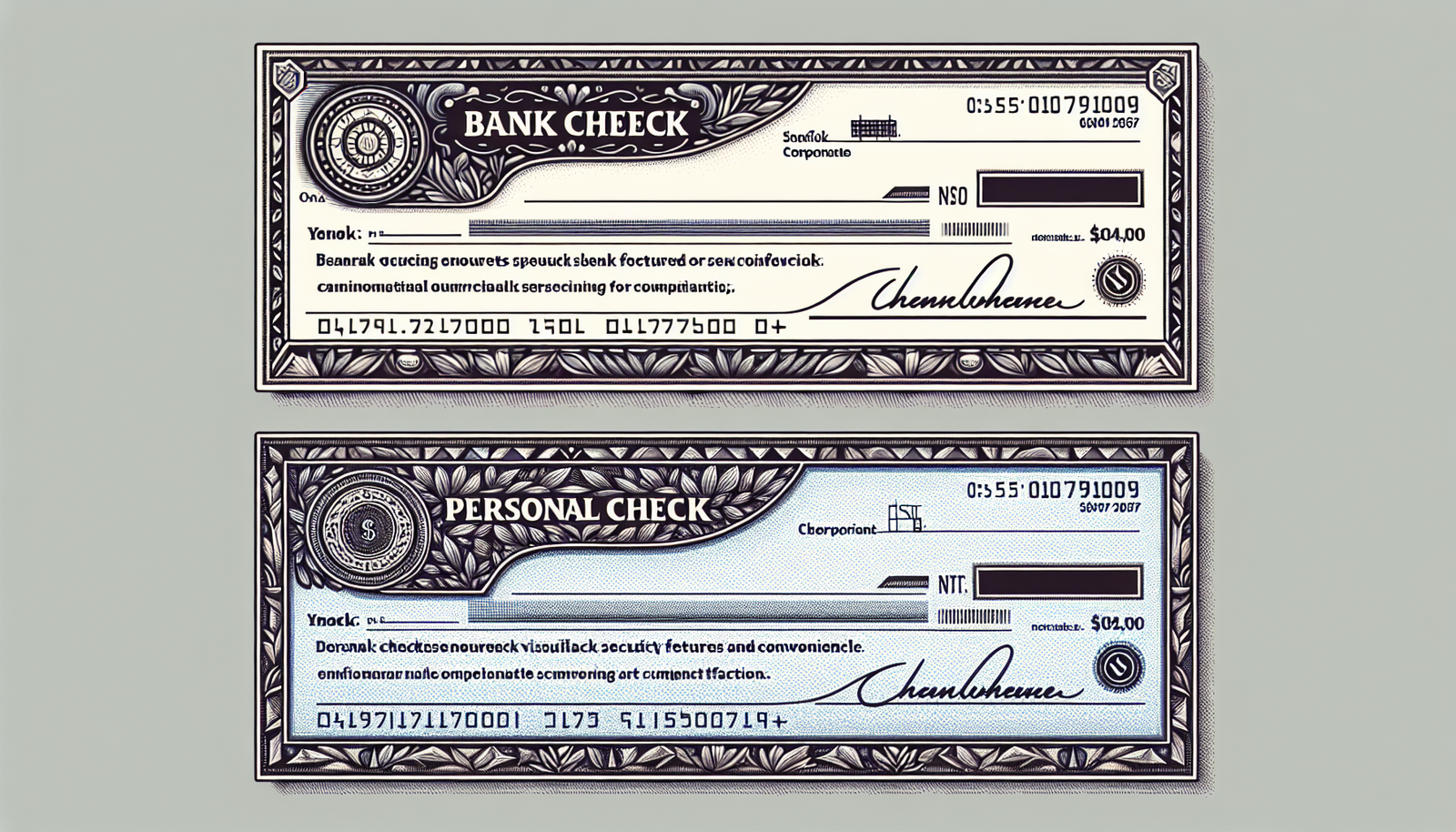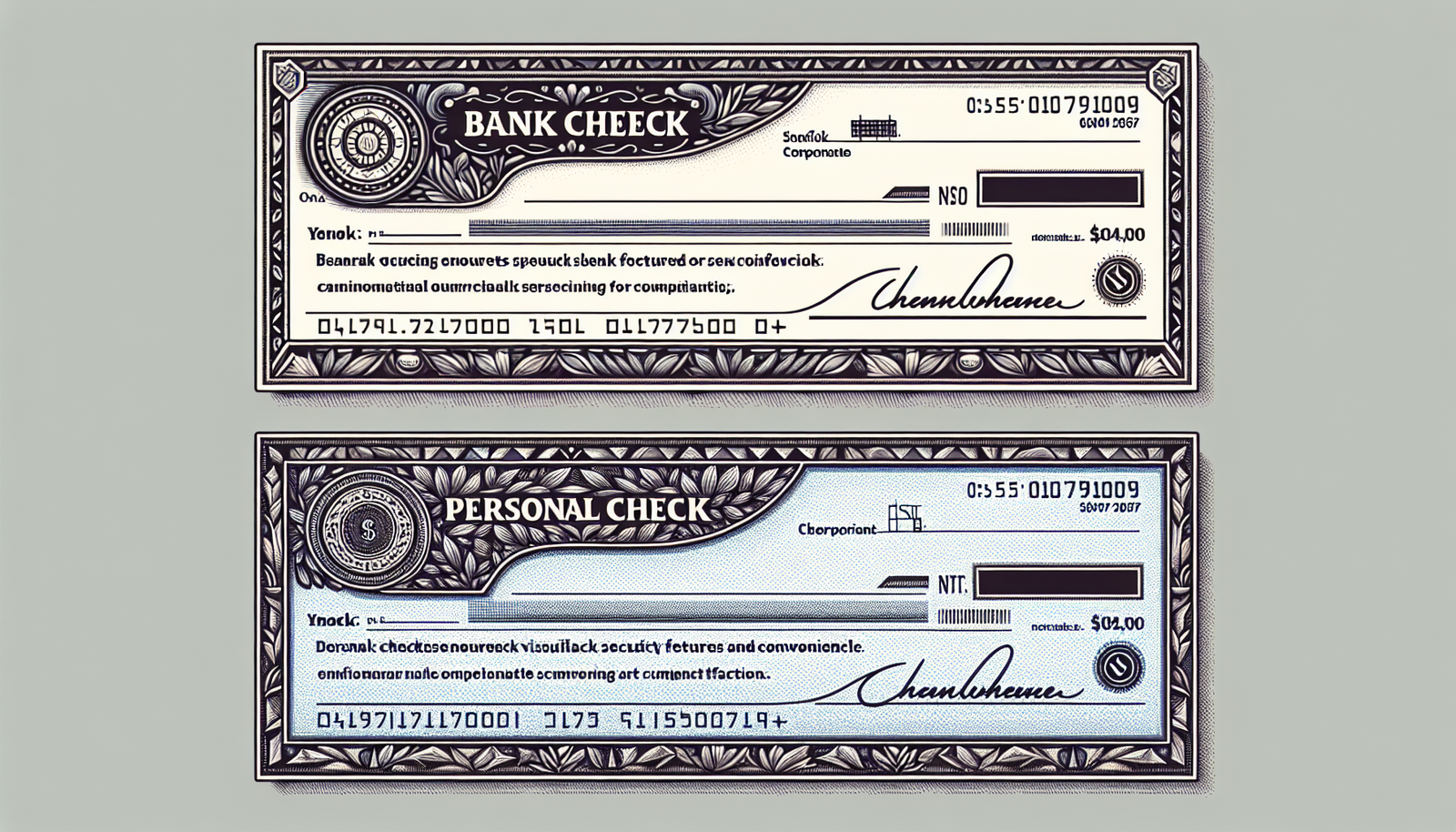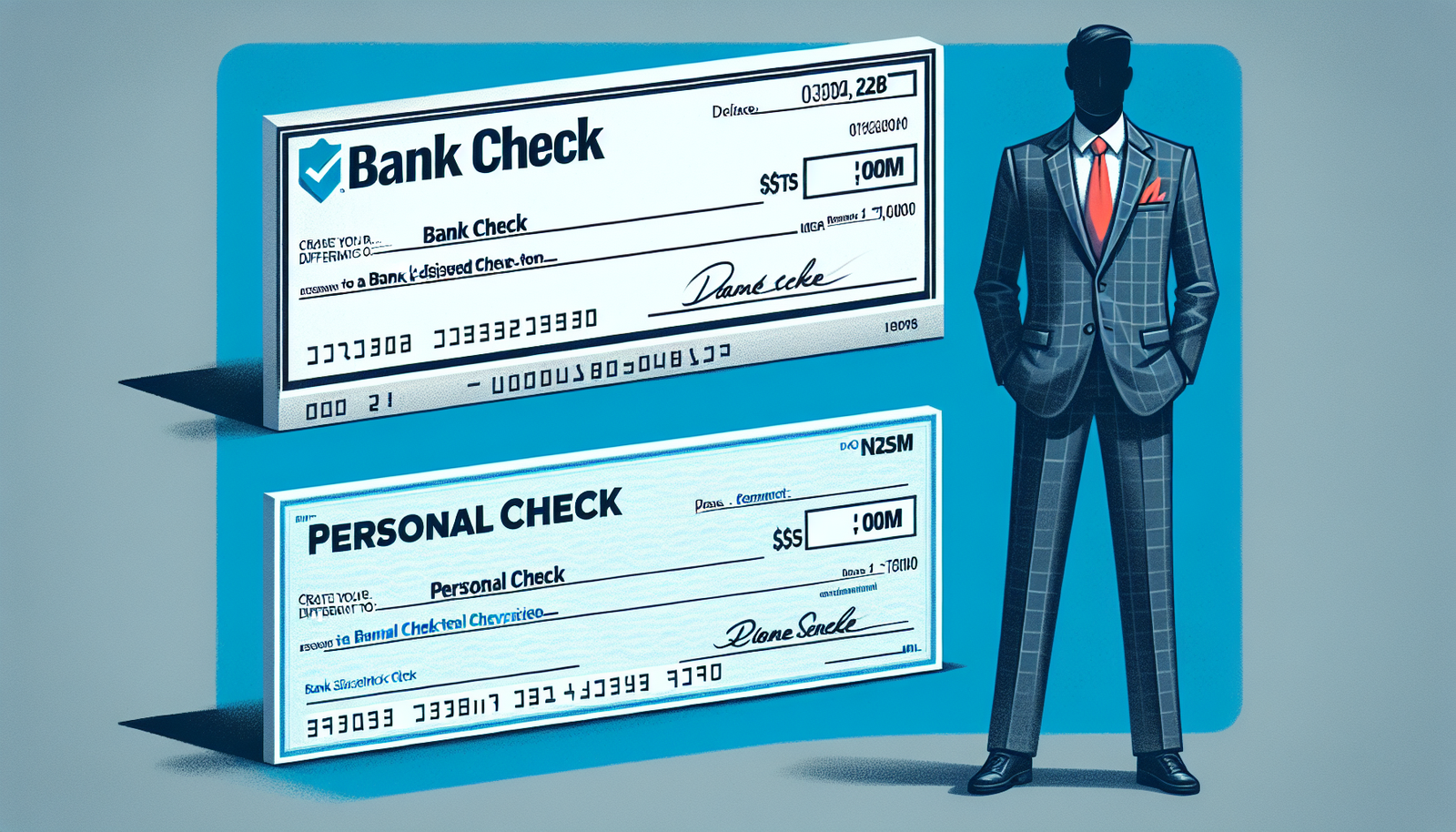
Embrace the vibrant world of finance as you explore the captivating narrative of “bank check Vs Personal Check.” This engaging piece invites you to journey through the intriguing maze of banking tools. Discover the nuanced differences between these two forms of payment and their unique applications, as detailed in this article. As you navigate this labyrinth of financial lexicon, prepare yourself to unravel the complex and often misunderstood distinction that keeps your finances humming efficiently behind-the-scenes. It’s a rollercoaster ride, but with the knowledge you gain, you’ll comfortably command every twist and turn of the track.

Definition of Bank Check
What is a Bank Check?
Imagine you have to make a large purchase and you don’t want to carry a lot of cash with you. This is where a bank check can be your knight in shining armor. A bank check is a type of check where the bank itself guarantees payment. The bank confirms and certifies that the payer has enough funds in their account to cover the amount specified on the check.
Features of a Bank Check
A bank check has several distinctive features. It is usually larger in size compared to regular checks. Usually, the word “Certified” or “Cashier’s” is printed on the top right or left corner. It has the bank’s watermark, and it’s often imprinted with a teller’s stamp. Furthermore, the bank’s name and contact information are also displayed prominently, thereby giving it an air of authenticity and security.
Types of Bank Checks
There are different types of bank checks like certified checks, cashier’s checks, money orders, and teller’s checks. A cashier’s check is issued by the bank and the funds are drawn directly from the bank’s own funds. A certified check, on the other hand, is a personal check that has been certified by the bank verifying that you have enough funds to cover the amount of the check. Money orders can be purchased from banks as well as from many retail stores, and the funds are generally prepaid. Teller’s checks are drawn from the bank’s own funds and are issued by the teller.
Uses of Bank Checks
When to use a Bank Check
A bank check comes handy when a personal check is not accepted, or when you need to make large payments, like buying a car or a house. It can also be used for deposits and other transactions where the recipient needs instant confirmation that the funds are available.
Benefits of using Bank Checks
The biggest benefit of using bank checks is that they often get cleared faster than personal checks since the bank guarantees the funds. Unlike cash, if lost or stolen, bank checks can be cancelled and replaced. This provides a safer way for large transactions.
Risks associated with Bank Checks
However, bank checks are not completely risk free. There is a chance of fraudulent checks existing. Always ensure to check the validity of a bank check. Getting a bank check can also have additional fees and once a bank check has been issued, it can be hard to cancel or stop the payment.
Process of Obtaining a Bank Check
Steps to get a Bank Check
For obtaining a bank check, you need to visit your bank or credit union and request for one. You need to provide the payee’s name, the exact amount and a reason for the check. The bank would then deduct the amount from your account and issue the check.
Cost of Obtaining a Bank Check
Depending on your bank, there may be a fee for obtaining a bank check. This fee can range anywhere from $10 to $15. Some banks also offer free bank checks to their customers who meet certain requirements.
Duration for processing a Bank Check
Since the funds are guaranteed by the bank, bank checks can be processed immediately by the recipient. However, the time taken to issue a bank check by the bank can vary.

Definition of Personal Check
What is a Personal Check?
A personal check is a slip of paper that is linked to your checking account. You can use it to pay for things by writing it out to someone, who then cashes it or deposits it into their account.
Features of a Personal Check
A personal check contains vital information such as your name, address, check number, bank name, the amount of money in numeric and written form, place to write the payee’s name, and a space for your signature. There are also some security features included in the check like microprinting, watermark, and a security screen.
Types of Personal Checks
There are different types of personal checks including single checks and duplicate checks. A duplicate check provides a carbon copy of every check you write whereas, a single check does not provide any copy.
Uses of Personal Checks
When to use a Personal Check
Personal checks are ideal for making payments such as paying bills, rent or giving a gift. They help keep a record of payment and can be used when direct electronic access to a bank account is not available.
Benefits of using Personal Checks
Writing a personal check gives you control over when the money is taken from your account. It can also provide a physical trail of payment for record-keeping purposes. There are also typically no fees for writing personal checks.
Risks associated with Personal Checks
However, personal checks carry certain risks. They can be denied for insufficient funds, and it may take several days for the payment to process. Moreover, writing a check can expose your account number to others.
Process of Writing a Personal Check
Steps to Write a Personal Check
To write a personal check, you’d need to fill in the date, name of the person or company you’re paying, the amount in numbers and in words, and then sign the check.
Cost of a Personal Check
Usually, personal checks cost depends on the bank, the style, and the type of checking account you have. Some banks charge around $20 for a box of checks, however, it could be costlier to order checks from a third-party vendor.
Duration for Cashing a Personal Check
The duration for cashing a personal check can vary depending on the bank policies. It can take a few days for the funds to transfer from one account to another.
Bank Check Vs Personal Check: A Comparison
Differences in definition
Evidently, a bank check and a personal check are two different beasts. They serve different purposes. While a bank check is a check guaranteed by the bank itself, a personal check is simply a contract between you and the recipient.
Differences in uses
Typically, you’d go for a bank check for larger, more significant transactions where assurance of payment is needed. Personal checks, on the other hand, are typically used for routine expenses.
Differences in processes
The process of obtaining a bank check involves the bank verifying and freezing funds, hence takes more effort than just drafting a personal check. Personal checks are easier to write and issue but may take longer to process.
The Security of Bank Check Vs Personal Check
Security measures for Bank Checks
There’s a certain sense of security associated with bank checks since they’re directly tied to the bank’s funds. Most bank checks come with safety measures like watermarks and heat-sensitive ink that make them difficult to counterfeit.
Security measures for Personal Checks
Personal checks are considered lower on the security scale. They carry your personal banking information that can be misused if exposed. Though they have some security features, they aren’t as safe as a bank check.
The Safety of Bank Check Vs Personal Check
Overall, bank checks often triumph in the safety arena. But caution should be exercised with both. With bank checks, beware of counterfeits, and only accept them from trusted sources. As for personal checks, limit the checks you write to decrease exposure of your banking information.
The Convenience of Bank Check Vs Personal Check
Convenience factors of Bank Checks
Bank checks are a good choice for transactions requiring immediate funds availability. However, securing one can be a bit time-consuming and may require a trip to the bank.
Convenience factors of Personal Checks
Conversely, personal checks can be written anytime and anywhere, making them more convenient for daily use. However, it takes time to clear and some places may not accept personal checks due to the risk of insufficient funds.
Comparing the Convenience of both Checks
While personal checks win in terms of ease of issuance, bank checks take the cake when it comes to quick clearance and a larger acceptance rate.
Conclusion: Choosing Between Bank Check and Personal Check
Situations favourable for Bank Check
If you’re dealing with larger amounts or need to exude trust in your transactions, bank checks would suit you better. It is also beneficial if you want the money to be readily available to the recipient.
Situations favourable for Personal Check
If you need to make regular, small payments and convenience is your guiding star, casting a personal check will serve you well. It is also beneficial if you want to maintain a record of your payments.
Choosing based on your specific needs
Ultimately, whether to tread the bank check path or the personal check route depends on your individual circumstances. Both have their pros and cons, and understanding them will help you make a more informed choice. You have to balance your need for convenience, security, and acceptance while choosing between a bank check and a personal check.

